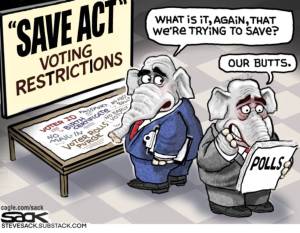Our worse than-almost-nothing Congress
Published 1:11 pm Wednesday, May 2, 2012
WASHINGTON — If you were to stroll by the House chamber today — or tomorrow, or the next day, or the day after that — you would arrive at the ideal time to see what the lawmakers do best: absolutely nothing.
It’s another recess week for our lazy leaders. Oh, sorry: “Constituent Work Week” is what they’re calling it these days, as if lawmakers were filling potholes and making calls to Social Security rather than raising campaign cash.
By the time the Republican-led House returns next week, members will have been working in Washington on just 41 of the first 127 days of 2012 — and that was the busy part of the year. They are planning to be on vacation — er, doing “constituent work” — 17 of the year’s remaining 34 weeks, and even when they are in town the typical workweek is three days.
Good work if you can get it — but the behavior is doing quite a job on the rest of us. On those infrequent occasions the House is in session, the Senate, also enamored of recess, often isn’t, which helps explain why the two chambers can’t agree on much of anything.
To call this 112th Congress a do-nothing Congress would be an insult — to the real Do-Nothing Congress of 1947-48. That Congress passed 908 laws. To date, this one has passed 106 public laws. Even if they triple that output in the rest of 2012 — not a terribly likely proposition — they will still be in last place going back at least 40 years.
Doing nothing would arguably be preferable to what the House is actually doing. Lawmakers have staged 195 roll-call votes so far this year, which sounds like a lot until you realize that boils down to only about 60 pieces of legislation, including post-office namings. Among the 60:
•The Mark Twain Commemorative Coin Act.
The Sportsmen’s Heritage Act of 2012.
Legislation requiring the Treasury to mint coins commemorating the 225th anniversary of the U.S. Marshals Service.
The World War II Memorial Prayer Act.
The Permanent Electronic Duck Stamp Act.
The few pieces of important legislation of this Congress, such as the payroll-tax break and the debt-limit increase, have been passed by the Republican majority under pressure and duress. Republican leaders claim that a heavy schedule means bigger government, but the lax schedule has been challenged by no less a conservative than firebrand freshman Allen West.
This is not to suggest that the Democratic-controlled Senate is blameless. The Washington Post’s Paul Kane went through Senate roll-call votes from this year and found that, of the 87 votes, the majority were on just three bills: 25 on the highway bill, 16 on the postal bill and 13 on an insider-trading bill. Sixteen others were on confirmations.
But there is a crucial difference: While a simple majority in the House can pass pretty much anything without agreement of the minority, the Senate is traditionally where bills go to die. Because the Democrats lack a filibuster-proof majority, they can bring virtually nothing to a vote without the blessing of the Republicans. Even with that high hurdle, the Senate has been able to slog through a number of bills in recent weeks: a long-term renewal of the surface transportation bill, renewal of the Violence Against Women Act, postal reform and a bill making it easier for companies to go public.
The last of those passed the House, too, but the other three are awaiting action. Of those, the failure to pass a long-term highway bill is particularly glaring. House Speaker John Boehner announced in November that he was proceeding with the bill, but so far he has been able to pass only a short-term extension. The House also has yet to act on the China currency bill the Senate passed last fall. Instead, House Republicans have voted repeatedly on budgets that will never be followed and similarly doomed attempts at repealing Obama priorities.
With such a lean agenda, filling even 41 days has been a challenge. House Republicans are now devoting full floor debates to bills such as H.R. 2087, “To remove restrictions from a parcel of land situated in the Atlantic District, Accomack County, Virginia.” That issue — allowing development on a 32-acre property — was so crucial to the Republic that lawmakers had five roll-call votes on the topic.
They dressed it up and called it a “jobs bill” — but really it was another bill showing that House Republicans aren’t doing theirs.
Dana Milbank is a Washington Post columnist. His email address is danamilbank@washpost.com.


